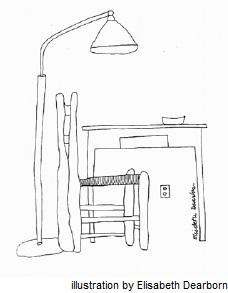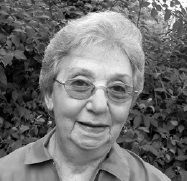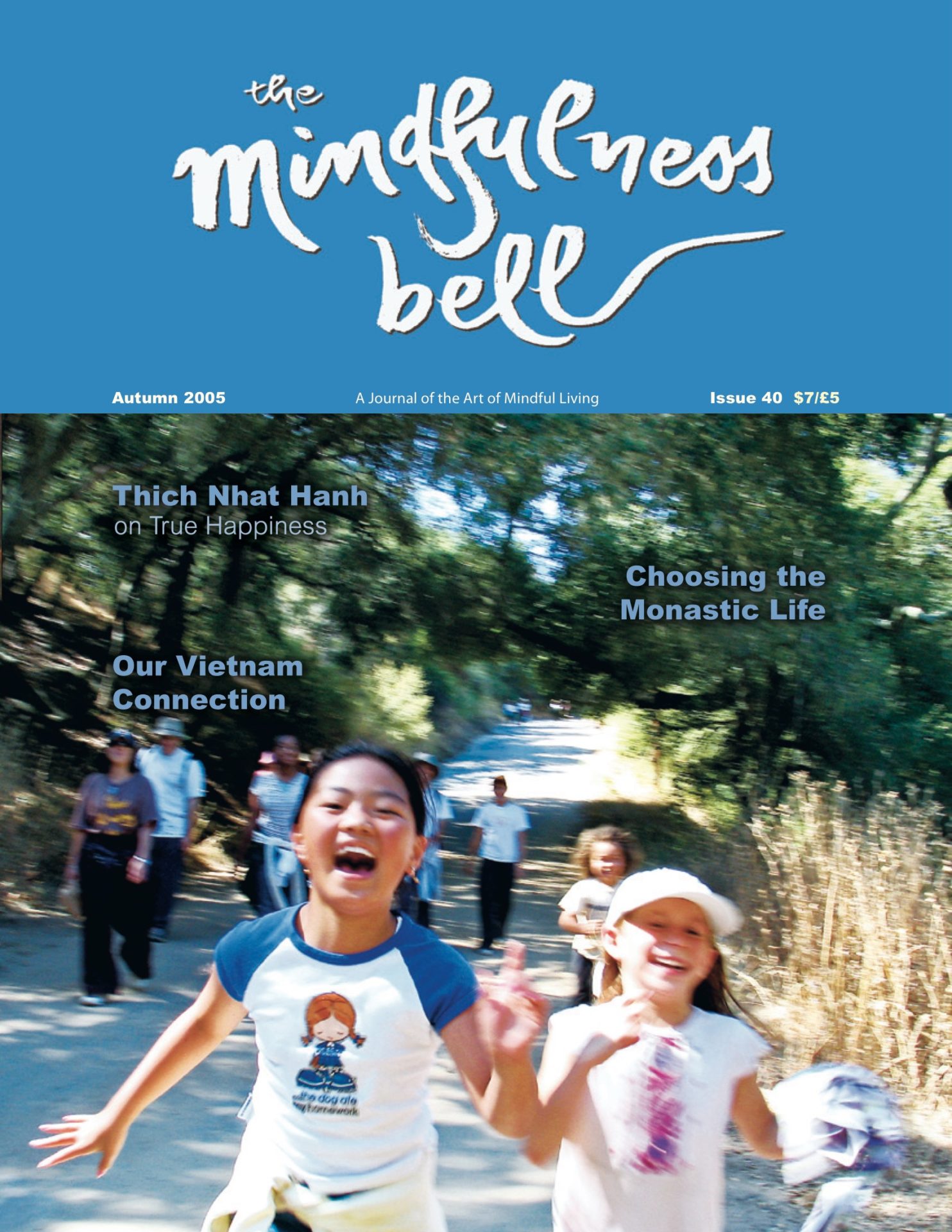
A Path to Healing
By Janice Rubin
I am in my twelfth year of teaching adults to write their autobiographies—a new career begun after I had retired from a career in journalism—and in my fifth year of practice with my Sangha. Without knowing anything about Buddhism or the existence of a blueprint for decency known as the Five Mindfulness Trainings, I had created an atmosphere in my classes and a code of behavior that I later found mirrored in the practice community I visited in 2001.

A Path to Healing
By Janice Rubin
I am in my twelfth year of teaching adults to write their autobiographies—a new career begun after I had retired from a career in journalism—and in my fifth year of practice with my Sangha. Without knowing anything about Buddhism or the existence of a blueprint for decency known as the Five Mindfulness Trainings, I had created an atmosphere in my classes and a code of behavior that I later found mirrored in the practice community I visited in 2001. No wonder I felt I had truly come home!
Retiring after twenty-one years, I decided to review my life, beginning with my earliest memories. I found the process to be painful at times, but was determined to finally face my demons. Writing my memoirs was therapeutic, and I wondered whether others might find it helpful. When I shared my writing with my therapist, she suggested that I teach so that others might benefit from the process.
I teach three semesters a year, each one eight weeks long. Classes are two hours long and limited to ten persons. I tell new students that writing their autobiography is like taking a magical mystery tour—they don’t know where they’ll end up when they start out, they don’t know what means they will use to get there, and when they arrive, they won’t be the same person who started the journey. In the process they will develop compassion for those they feel have wronged them, discover they have accomplished much more than they have given themselves credit for, and find they like themselves a lot more than they did when they began.
I suggest that beginners start out by following the syllabus, which has questions related to each period of life and can be used to jog the writer’s memory. They write at home and come to class prepared to share their writing. Each person is allotted time to read and to receive feedback from the others. Those who say they don’t have any childhood memories are inspired by the material I provide and by hearing others’ stories. As we write, the pathways between memories are lubricated so that memories return, sometimes faster than we can write about them.
Most of my students are between fifty and eighty-five years of age. Most come with the intention of writing their life stories to pass on to their children and grandchildren; many return to continue examining their lives in an effort to rid themselves of feelings of anger, guilt, and anxiety that are preventing them from enjoying their days. Some come because they have reached a significant stage in their lives; they want to understand where they’ve been so they may chart a path for their future.
Among the writers, some have been childhood victims of physical, emotional, or sexual abuse. In the supportive atmosphere that prevails in our workshops, many feel safe exploring events that need to be examined in order to rid them of suffering. Some are recovering from alcoholism or other addictions; some are grieving the loss of dear ones. Some are closeted homosexuals or abused spouses who are not yet able to share their plight.
Cultivating Compassion
The first mindfulness training talks about cultivating compassion and protecting life. It has been said that one may kill with words; it is also true that a kind word, appropriately offered, can be life enhancing. New students are asked to listen to each other with an open mind, without judgment. In commenting on another’s writing, they are asked to be mindful of the reader’s feelings. I watch with increasing love for my students as I see heads nod and tissues wipe away a tear while someone writes about the disappearance of her father when she was four years old. If empathy and compassion were blossoming plants, our classroom would be ringed with flowers.
One time, during introductions on the first day of class, a new student mentioned that she was twenty-five years old. A man in his seventies said, “You’re so young. You haven’t lived yet. What do you have to write about?” I told the group about the twenty-one-year-old in a previous class who had taught us what life had been like in East Germany and had participated in pulling down the Berlin Wall. I told them about children in elementary school who had written about their memories of accidents, birthday parties, the death of a parent. Unfortunately, my illustrations were not sufficient to counteract the damage done by a thoughtless remark; the young woman dropped out of the class and did not respond to messages I left her.
Generosity
The second mindfulness training reminds us of the importance of not taking what belongs to others and encourages generosity. In my classes this training is symbolized by a timer and a set of wind-up clacking teeth. The two-hour session is barely long enough for ten people to read and receive feedback so when participants don’t respect their time limits it can become a problem. In order to prevent hurt feelings, I set a timer when each person begins to read. When the bell goes off, that person’s time is up. The conversations that sometimes develop in response to a particular reading can wreak havoc with a schedule. So I wind up my two-legged chattering teeth and, as they dance across the table, we laugh and remind ourselves why we’ve come to class.
Protection
The third mindfulness training makes us aware of the nature of our ties with family and the importance of protecting children from harm. In our writing we deal with destructive as well as healing ties. We come to understand not only how our parents raised us, but how their upbringing influenced the way they behaved as adults. When we write about our parents as little children we begin to understand their suffering and we realize they did the best they could. At the same time, we develop compassion for ourselves as children who suffered at their hands. We also develop understanding and compassion for other family members, and it is not unusual for my students to reach out to family members from whom they have been estranged, and to reconnect with childhood friends.
A recovering alcoholic, writing about the abusive, alcoholic father of his childhood, gradually began to soften toward him when he wrote about his father’s boyhood in Ireland, where his mother died when he was very young and his father indentured him to a farmer because he could not care for all the children in the family. One woman came feeling angry and bitter toward her mother who had died thirty years before. The mother had had seven children, some by the seven men to whom she had been married, and some by others. My student was the middle child who had assumed responsibility for raising the three youngest ones. She had been physically and emotionally abused by her mother and an older sibling and had been sexually abused by one of her stepfathers. In four years of writing, she developed a tolerant respect for the mother who had lost her own mother as a child, was raised by an unloving aunt who threw her out when she became pregnant at fifteen, and managed to keep her seven children together and enjoy life by using her wits. She also developed a healthy respect for her own strong character that had enabled her to create a stable, loving marriage and a good life with her husband and children as she continued to help her siblings.
Deep Listening, Loving Speech
Without offering the gift of deep listening and mindful speech to one another, our writing Sangha could not thrive. I tell my students to follow their writing wherever it goes and to censor nothing, but to share only what is comfortable for them. We offer a safe haven in which there is virtual freedom of expression.
A woman who had been the victim of incest by her older brother during her childhood, blamed him for her failed marriages. When she tried to talk to him about it, he either denied anything had occurred or blamed her for seducing him. She read us a letter she had written to him, describing how she had felt as a little girl who had lost the right to her own body. As she stifled a sob, the person next to her put an arm around her shoulder. Asked whether she would mail the letter, she said she would not; it was enough for her to have been able to talk about it to friends who could understand.
Mindful Consumption
My students are well aware of the need for mindful consumption and good health practices for themselves and the planet. The ailments of an aging population are not far from their consciousness and many are involved in regular exercise programs. The recovering substance abusers write about the effect of their addictions on their self-image, careers, and families, and take pride in their years of sobriety. Since most are parents and grandparents, they usually share a commitment to protect the environment, promote peace, and encourage intelligent radio and television programs for all ages.
I love the folks who take my classes; they are my writing family. It gives me great joy to watch shy individuals blossom, and to see a group of strangers become friends. What better basis is there for friendship and love than sharing one’s life story with others in a loving, nonjudgmental atmosphere?
When I wrote my former therapist to tell her that I had finally found my spiritual family, she informed me that she too sits with a Sangha affiliated with Thich Nhat Hanh’s community. I was delighted, but not surprised.

Janice Rubin, of Oakland, New Jersey, sits with the Practice Community at Franklin Lakes. She is a teacher, writer, and author.

